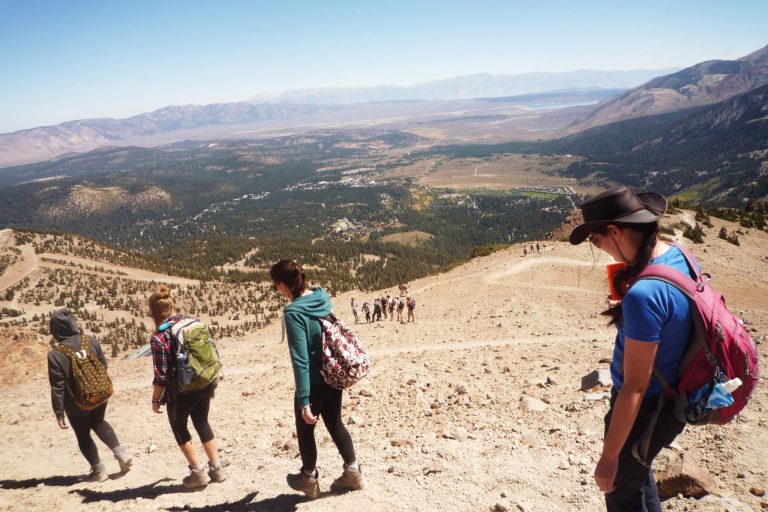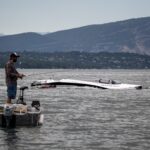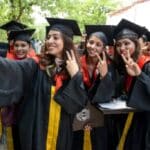
“It is really, really important that citizens learn to value their environment and to understand the science behind the great ecological dilemmas which face us all… All these aspirations remain ‘pie in the sky’ unless every pupil has an entitlement to extend his or her study […] out of the classroom. It is in the field […] where acting locally becomes thinking globally.” – Professor Lord May of Oxford, Former President of the Royal Society
A child’s cognitive abilities are best developed through experience. We know birds can fly because we’ve actually seen them do it; we know touching a whistling kettle would burn our fingers because we tried it once and it hurt; we put on jackets when it gets chilly because we know, through experience, what to do when the weather changes.
Using our senses of sight, sound, smell, taste and touch, we learn valuable life lessons on how to distinguish right from wrong, bad from good, and our likes from our dislikes. And throughout this ever-changing journey, one constant remains true – that in order to really “get it”, we must first experience it.
This is why fieldwork is key to the student learning experience. When we experience, we learn, and what we learn through experience, we’re unlikely to forget.
The University of Exeter, a respected member of the Russell Group, is a global institution that holds the worth of relevant field experience in incredibly high regard. At its Penryn Campus, every single course offered by the College of Life and Environmental Sciences provides hands-on learning opportunities in the field. The College offers degrees in Geography and the Biosciences, where students from both disciplines are able to participate in field courses during each year of their degree.

In 2002, the Field Studies Council (FSC) released a report titled: Teaching Biology Outside the Classroom: Is it heading for extinction? In the report, the FSC stressed it was time for fieldwork to become a compulsory facet of environmental education.
Almost 15 years later, the value of hands-on, in-the-field education has become undeniable. Stuart Nundy, an Outdoor Activities Officer based in Hampshire, UK, has spent a considerable portion of his professional career looking into the benefits of practical learning opportunities. His research summarised three key advantages:
- Fieldwork has a positive impact on long-term memory since the fieldwork setting itself is engaging, and therefore memorable
- Residential experience encourages personal growth and greatly develops social skills
- Reinforcement between the affective and the cognitive is interconnected and interchangeable – each one influences the other and provides a solid platform for higher learning
“Residential field courses, data gathering exercises, getting out there and being inspired by the environment – but actually really doing it, allows a much deeper learning once people return to the lecture room or the library and they’ve actually smelt it, touched it, felt it and taken pictures of it,” says Professor Brendan J. Godley, Director of the Centre for Ecology & Conservation at the University of Exeter, and leader of a Biosciences field course to Kenya.
“Everything’s much richer and deeper,” he adds, “It takes it beyond the two dimensions of the PowerPoint because they’ve really had experiential learning.”

Penryn Campus Life and Environmental Sciences students begin with local field courses, exploring the natural environment on campus, at nearby beaches, and in the picturesque and geologically diverse Cornish countryside. For Geography and Environmental Science students, these trips might focus on geomorphological processes, water quality monitoring, or cultural geography, while Bioscientists visiting the same spaces might learn about mammal trapping or mist netting techniques.
Dr Andrew McGowan, Director of Undergraduate Field Courses and leader of field trips to Cyprus, Scotland, and Kenya, says, “Cornwall serves as a living laboratory for all of our students, who benefit from a high diversity of habitats, species, and cultural activities right on their front doorstep. It is the perfect place to learn about techniques for data collection and study design—highly transferrable skills that the students need to master not just to complete their degrees, but also to be competitive in the job market once they leave the University.”
Methodological expertise is further developed during week-long residential field courses that take place in the second year of each degree. These more immersive experiences, in locations such as the Isles of Scilly, Cypress, and Iceland, give the students an opportunity to interact more with local stakeholders who have a vested interest in the environment—including fishermen, conservationists, agriculturalists, and scientists. Exchanges with these individuals help students understand the value of natural habitats and importance of problems emerging at the intersection of ecology and society.

Professor Catherine Leyshon, Director of Education for the College, says, “The insights we get from professionals working on real-world issues really enhance student learning and also encourage them to think about how to apply their skills in a career in the future.”
Professor Leyshon takes Geographers and Environmental Scientists to California. “We start the trip in the spectacular surroundings of Yosemite National Park,” she says, “where students work in an interdisciplinary way on projects about the physical and cultural landscape, environmental challenges in the park, and the visitor experience. Half the group then travel to the Eastern Sierra Nevada to undertake environmental modelling and explore the physical processes that shape arid landscapes. The rest of the students head to the Californian redwoods to research environmental and social change in the coastal city of Santa Cruz. Over the course of the trip, field course participants interact with a range of experts in topics as diverse as water management, landscape restoration, environmental governance, homelessness, behaviour change, and community projects.”
The field course experience for Penryn Campus students culminates in Field Course Fortnight, a unique two-week period during which more than 200 students and 30 academics simultaneously participate in field courses in six different countries. The destinations, ranging from the Bahamas to Borneo to Costa Rica, are hotspots for biology, geography, and environmental science.
During Field Course Fortnight, students use their expertise to design and conduct mini research projects while picking up new information about the natural environments in which they are working for the first time. They explore issues related to ecology, evolution, conservation, geomorphology, and animal behaviour, while also learning about the historical, social, and economic relationships between humans and nature.

The trips offer a unique opportunity to learn about science communication, through personal engagement with peers, conversations with experts, and, more publicly, via dedicated Field Course Fortnight Twitter feeds. The social media element of the trip allows students to share blogs, vlogs, and photos that not only celebrate the beautiful habitats in which they are working, but also discuss the challenges associated with traveling, finding innovative ways to deal with unexpected field conditions, and tackling complex environmental problems like climate change.
Students find the trips to be challenging but invigorating. As Professor Godley notes, “Many students return home and say, ‘That was the best two weeks of my life!’ It’s a fantastic experience for them because they’re inspired. They’ve experienced the realities of the issues, and then have a much clearer idea of how they might move forward in further studies or employment.”
Follow Exeter’s College of Life and Environmental Sciences on Twitter







